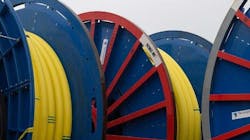TechnipFMC advances Hybrid Flexible Pipe in collaboration with Petrobras
TechnipFMC says that it has signed a technological order with Petrobras to accelerate the development and commercialization of Hybrid Flexible Pipe (HFP) as a standardized definitive solution for stress corrosion cracking by CO2 (SCC CO2), a phenomenon experienced with many flexible pipe systems used today.
TechnipFMC says that its HFP design is already in qualification, and that the strategic collaboration with Petrobras will further validate the pipe’s performance in presalt conditions, where weight and resistance to fatigue and corrosion are critical to long-term success.
Described by TechnipFMC as “a disruptive and scalable technology,” the company says that HFP is designed to withstand corrosive environments in ultra-deep water. According to TechnipFMC, it combines the benefits of conventional flexible pipe with lightweight, CO2-resistant composite materials – carbon fiber and polyether ether ketone (PEEK) thermoplastic polymer.
HFP will eliminate the need to regularly replace pipe due to damage by SCC CO2, TechnipFMC says, while retaining the benefits of the flexible pipe ecosystem. According to the company, it will define new standards for flexible pipe used in corrosive environments.
Jonathan Landes, President, Subsea at TechnipFMC, said: “Our aim is to make HFP a simplified, standardized solution. This collaboration combines our global expertise and our manufacturing capabilities in Açu, Brazil, to support Petrobras in achieving its strategic objectives.”
The technological order used by Petrobras is a form of public procurement aimed at developing innovative products or services. It enables the Brazilian government to stimulate innovation through initial funding and subsequent direct procurement of the developed product or service.
